Analyzing Hospitality Provision in the UK Travel and Tourism Sector
VerifiedAdded on 2024/05/31
|13
|4028
|398
Report
AI Summary
This report provides an analysis of the hospitality industry's role within the UK travel and tourism sector, focusing on the interrelationships between the two and the impact of business integration. It discusses the significance of hospitality in generating employment, income, and foreign direct investment, highlighting the importance of customer satisfaction and competitive strategies, using Radisson Hotel as a case example. The report also explores vertical and horizontal integration, examining their effects on hospitality businesses, including economies of scale and operational efficiencies. Furthermore, it touches upon planning the development of a hospitality business, emphasizing the rationale behind project decisions linked to target markets and operational requirements.
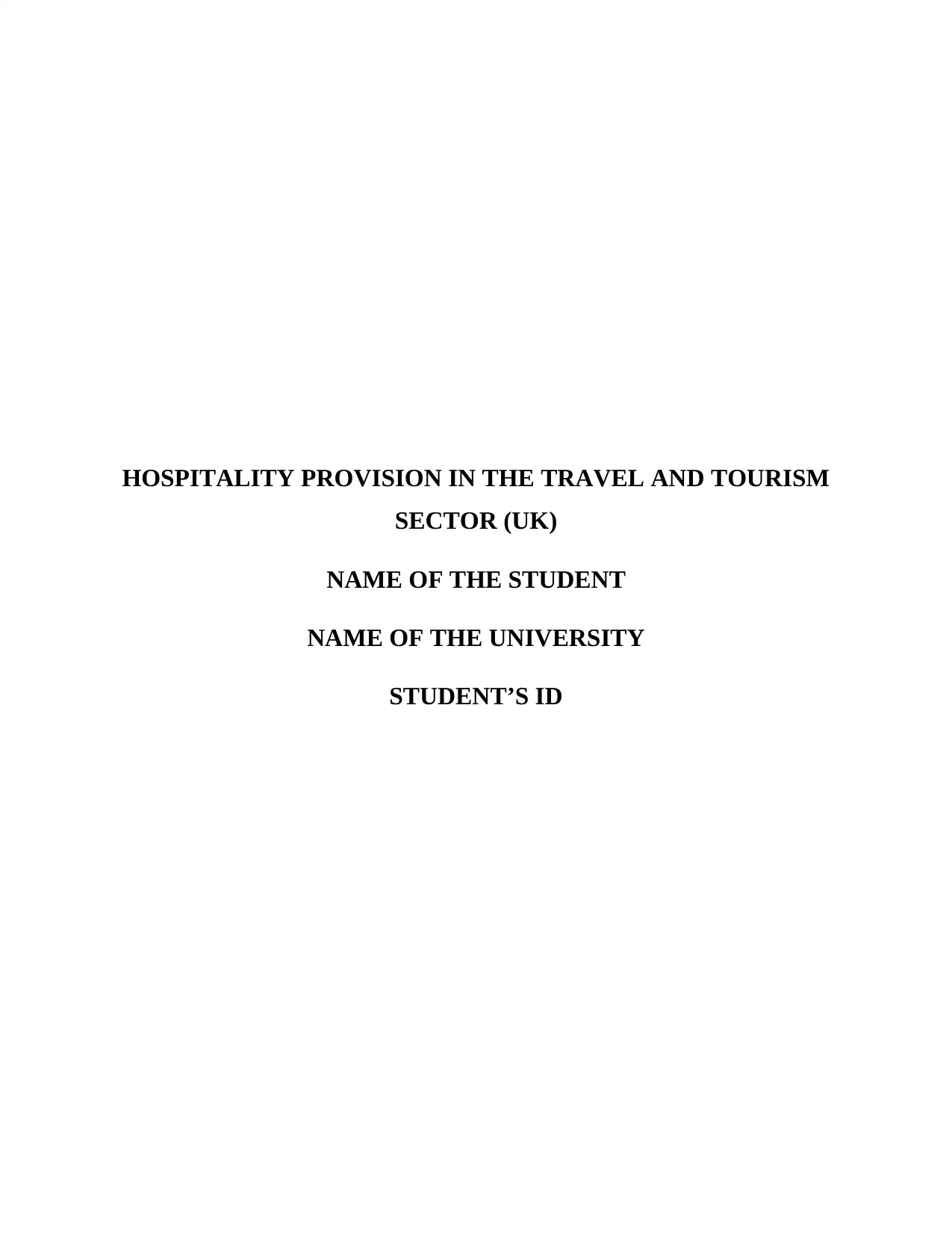
HOSPITALITY PROVISION IN THE TRAVEL AND TOURISM
SECTOR (UK)
NAME OF THE STUDENT
NAME OF THE UNIVERSITY
STUDENT’S ID
SECTOR (UK)
NAME OF THE STUDENT
NAME OF THE UNIVERSITY
STUDENT’S ID
Paraphrase This Document
Need a fresh take? Get an instant paraphrase of this document with our AI Paraphraser
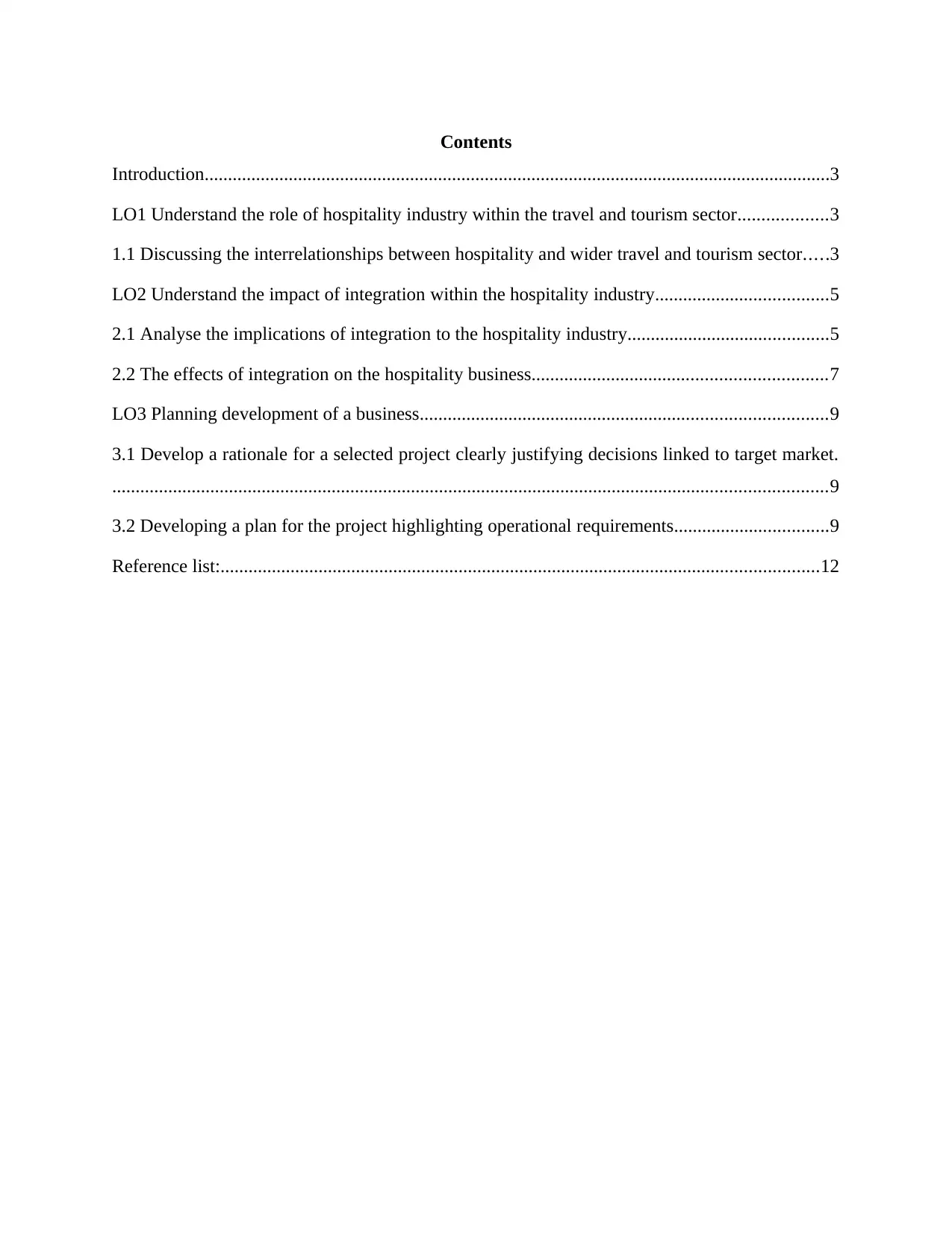
Contents
Introduction......................................................................................................................................3
LO1 Understand the role of hospitality industry within the travel and tourism sector...................3
1.1 Discussing the interrelationships between hospitality and wider travel and tourism sector.....3
LO2 Understand the impact of integration within the hospitality industry.....................................5
2.1 Analyse the implications of integration to the hospitality industry...........................................5
2.2 The effects of integration on the hospitality business...............................................................7
LO3 Planning development of a business.......................................................................................9
3.1 Develop a rationale for a selected project clearly justifying decisions linked to target market.
.........................................................................................................................................................9
3.2 Developing a plan for the project highlighting operational requirements.................................9
Reference list:................................................................................................................................12
Introduction......................................................................................................................................3
LO1 Understand the role of hospitality industry within the travel and tourism sector...................3
1.1 Discussing the interrelationships between hospitality and wider travel and tourism sector.....3
LO2 Understand the impact of integration within the hospitality industry.....................................5
2.1 Analyse the implications of integration to the hospitality industry...........................................5
2.2 The effects of integration on the hospitality business...............................................................7
LO3 Planning development of a business.......................................................................................9
3.1 Develop a rationale for a selected project clearly justifying decisions linked to target market.
.........................................................................................................................................................9
3.2 Developing a plan for the project highlighting operational requirements.................................9
Reference list:................................................................................................................................12
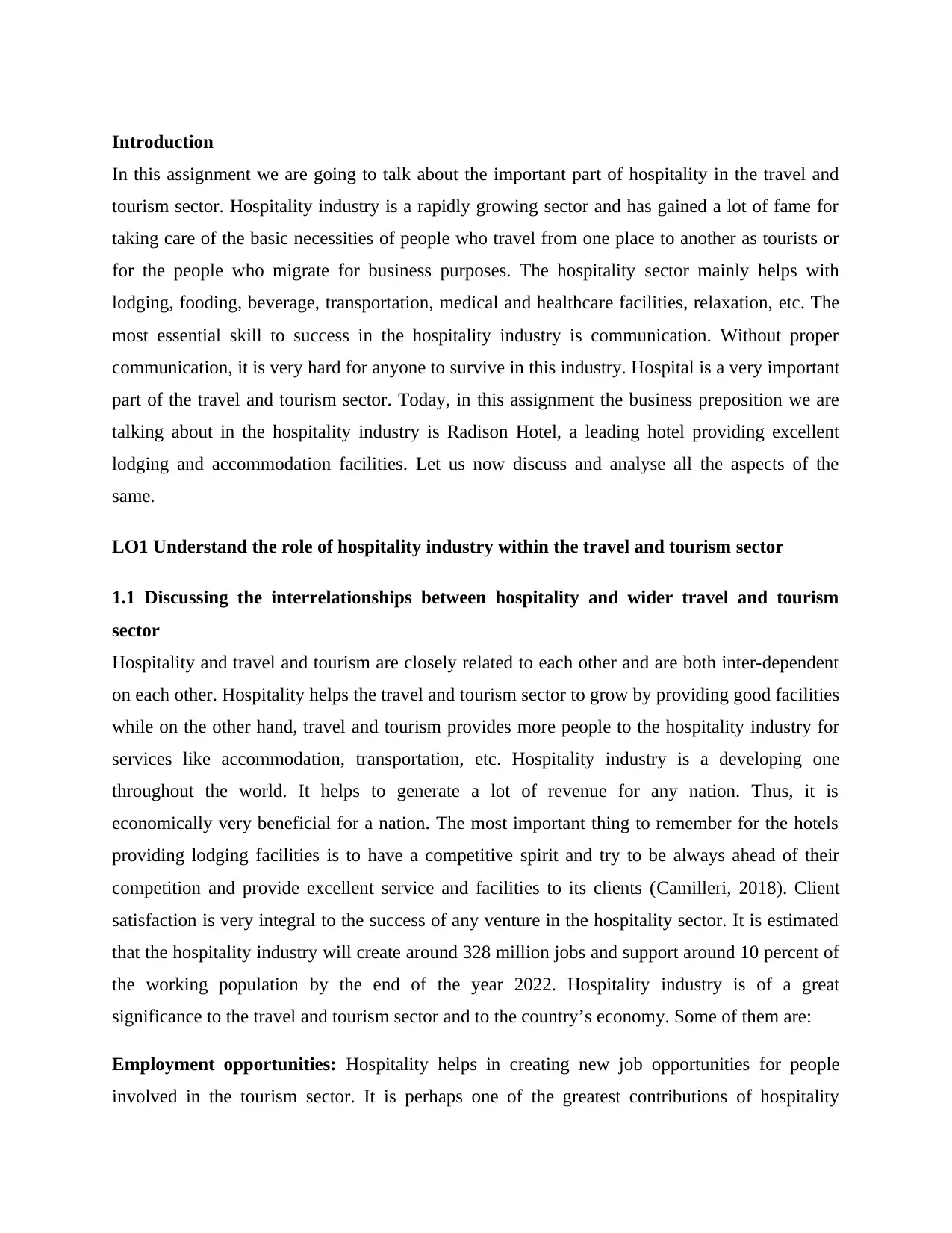
Introduction
In this assignment we are going to talk about the important part of hospitality in the travel and
tourism sector. Hospitality industry is a rapidly growing sector and has gained a lot of fame for
taking care of the basic necessities of people who travel from one place to another as tourists or
for the people who migrate for business purposes. The hospitality sector mainly helps with
lodging, fooding, beverage, transportation, medical and healthcare facilities, relaxation, etc. The
most essential skill to success in the hospitality industry is communication. Without proper
communication, it is very hard for anyone to survive in this industry. Hospital is a very important
part of the travel and tourism sector. Today, in this assignment the business preposition we are
talking about in the hospitality industry is Radison Hotel, a leading hotel providing excellent
lodging and accommodation facilities. Let us now discuss and analyse all the aspects of the
same.
LO1 Understand the role of hospitality industry within the travel and tourism sector
1.1 Discussing the interrelationships between hospitality and wider travel and tourism
sector
Hospitality and travel and tourism are closely related to each other and are both inter-dependent
on each other. Hospitality helps the travel and tourism sector to grow by providing good facilities
while on the other hand, travel and tourism provides more people to the hospitality industry for
services like accommodation, transportation, etc. Hospitality industry is a developing one
throughout the world. It helps to generate a lot of revenue for any nation. Thus, it is
economically very beneficial for a nation. The most important thing to remember for the hotels
providing lodging facilities is to have a competitive spirit and try to be always ahead of their
competition and provide excellent service and facilities to its clients (Camilleri, 2018). Client
satisfaction is very integral to the success of any venture in the hospitality sector. It is estimated
that the hospitality industry will create around 328 million jobs and support around 10 percent of
the working population by the end of the year 2022. Hospitality industry is of a great
significance to the travel and tourism sector and to the country’s economy. Some of them are:
Employment opportunities: Hospitality helps in creating new job opportunities for people
involved in the tourism sector. It is perhaps one of the greatest contributions of hospitality
In this assignment we are going to talk about the important part of hospitality in the travel and
tourism sector. Hospitality industry is a rapidly growing sector and has gained a lot of fame for
taking care of the basic necessities of people who travel from one place to another as tourists or
for the people who migrate for business purposes. The hospitality sector mainly helps with
lodging, fooding, beverage, transportation, medical and healthcare facilities, relaxation, etc. The
most essential skill to success in the hospitality industry is communication. Without proper
communication, it is very hard for anyone to survive in this industry. Hospital is a very important
part of the travel and tourism sector. Today, in this assignment the business preposition we are
talking about in the hospitality industry is Radison Hotel, a leading hotel providing excellent
lodging and accommodation facilities. Let us now discuss and analyse all the aspects of the
same.
LO1 Understand the role of hospitality industry within the travel and tourism sector
1.1 Discussing the interrelationships between hospitality and wider travel and tourism
sector
Hospitality and travel and tourism are closely related to each other and are both inter-dependent
on each other. Hospitality helps the travel and tourism sector to grow by providing good facilities
while on the other hand, travel and tourism provides more people to the hospitality industry for
services like accommodation, transportation, etc. Hospitality industry is a developing one
throughout the world. It helps to generate a lot of revenue for any nation. Thus, it is
economically very beneficial for a nation. The most important thing to remember for the hotels
providing lodging facilities is to have a competitive spirit and try to be always ahead of their
competition and provide excellent service and facilities to its clients (Camilleri, 2018). Client
satisfaction is very integral to the success of any venture in the hospitality sector. It is estimated
that the hospitality industry will create around 328 million jobs and support around 10 percent of
the working population by the end of the year 2022. Hospitality industry is of a great
significance to the travel and tourism sector and to the country’s economy. Some of them are:
Employment opportunities: Hospitality helps in creating new job opportunities for people
involved in the tourism sector. It is perhaps one of the greatest contributions of hospitality
⊘ This is a preview!⊘
Do you want full access?
Subscribe today to unlock all pages.

Trusted by 1+ million students worldwide
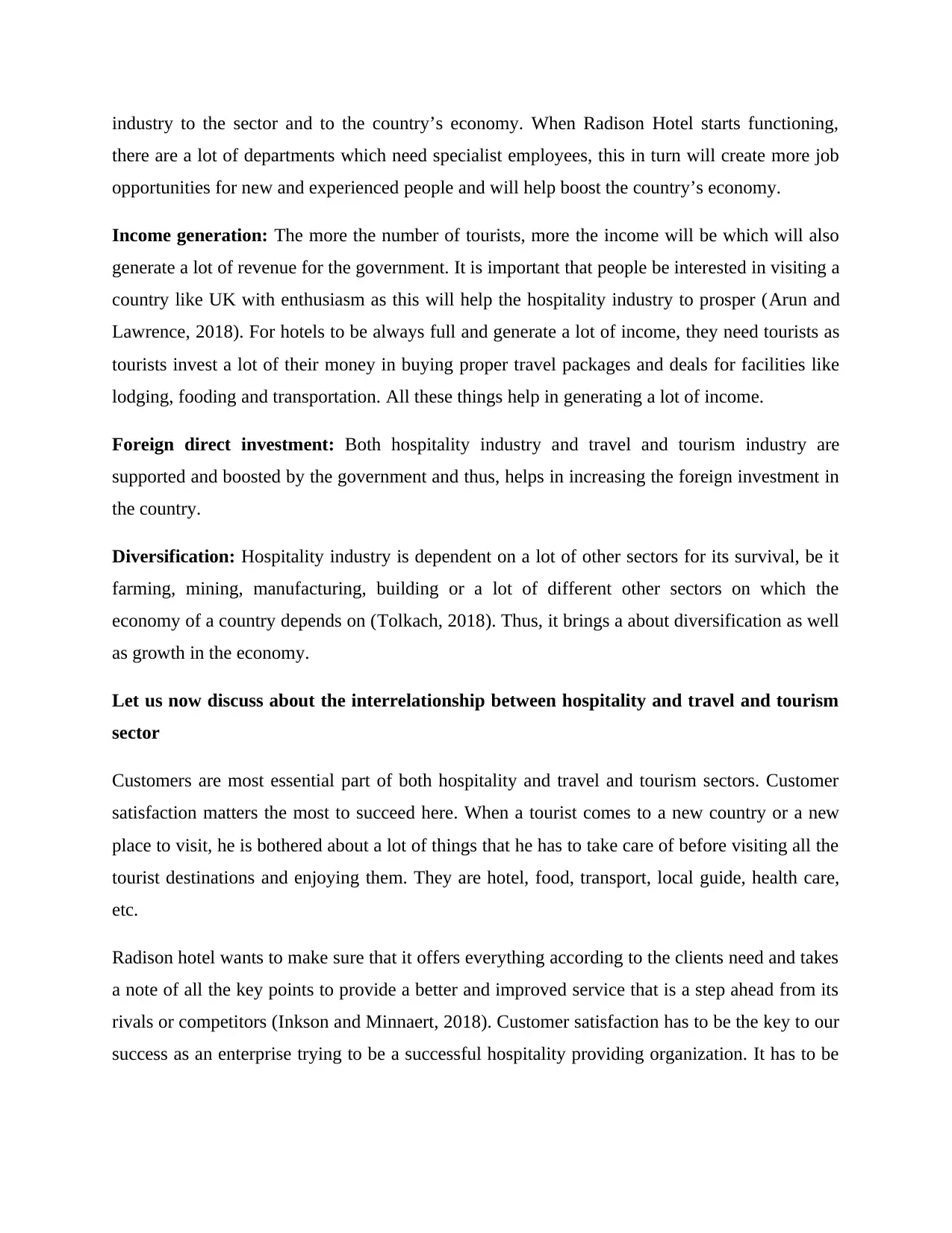
industry to the sector and to the country’s economy. When Radison Hotel starts functioning,
there are a lot of departments which need specialist employees, this in turn will create more job
opportunities for new and experienced people and will help boost the country’s economy.
Income generation: The more the number of tourists, more the income will be which will also
generate a lot of revenue for the government. It is important that people be interested in visiting a
country like UK with enthusiasm as this will help the hospitality industry to prosper (Arun and
Lawrence, 2018). For hotels to be always full and generate a lot of income, they need tourists as
tourists invest a lot of their money in buying proper travel packages and deals for facilities like
lodging, fooding and transportation. All these things help in generating a lot of income.
Foreign direct investment: Both hospitality industry and travel and tourism industry are
supported and boosted by the government and thus, helps in increasing the foreign investment in
the country.
Diversification: Hospitality industry is dependent on a lot of other sectors for its survival, be it
farming, mining, manufacturing, building or a lot of different other sectors on which the
economy of a country depends on (Tolkach, 2018). Thus, it brings a about diversification as well
as growth in the economy.
Let us now discuss about the interrelationship between hospitality and travel and tourism
sector
Customers are most essential part of both hospitality and travel and tourism sectors. Customer
satisfaction matters the most to succeed here. When a tourist comes to a new country or a new
place to visit, he is bothered about a lot of things that he has to take care of before visiting all the
tourist destinations and enjoying them. They are hotel, food, transport, local guide, health care,
etc.
Radison hotel wants to make sure that it offers everything according to the clients need and takes
a note of all the key points to provide a better and improved service that is a step ahead from its
rivals or competitors (Inkson and Minnaert, 2018). Customer satisfaction has to be the key to our
success as an enterprise trying to be a successful hospitality providing organization. It has to be
there are a lot of departments which need specialist employees, this in turn will create more job
opportunities for new and experienced people and will help boost the country’s economy.
Income generation: The more the number of tourists, more the income will be which will also
generate a lot of revenue for the government. It is important that people be interested in visiting a
country like UK with enthusiasm as this will help the hospitality industry to prosper (Arun and
Lawrence, 2018). For hotels to be always full and generate a lot of income, they need tourists as
tourists invest a lot of their money in buying proper travel packages and deals for facilities like
lodging, fooding and transportation. All these things help in generating a lot of income.
Foreign direct investment: Both hospitality industry and travel and tourism industry are
supported and boosted by the government and thus, helps in increasing the foreign investment in
the country.
Diversification: Hospitality industry is dependent on a lot of other sectors for its survival, be it
farming, mining, manufacturing, building or a lot of different other sectors on which the
economy of a country depends on (Tolkach, 2018). Thus, it brings a about diversification as well
as growth in the economy.
Let us now discuss about the interrelationship between hospitality and travel and tourism
sector
Customers are most essential part of both hospitality and travel and tourism sectors. Customer
satisfaction matters the most to succeed here. When a tourist comes to a new country or a new
place to visit, he is bothered about a lot of things that he has to take care of before visiting all the
tourist destinations and enjoying them. They are hotel, food, transport, local guide, health care,
etc.
Radison hotel wants to make sure that it offers everything according to the clients need and takes
a note of all the key points to provide a better and improved service that is a step ahead from its
rivals or competitors (Inkson and Minnaert, 2018). Customer satisfaction has to be the key to our
success as an enterprise trying to be a successful hospitality providing organization. It has to be
Paraphrase This Document
Need a fresh take? Get an instant paraphrase of this document with our AI Paraphraser
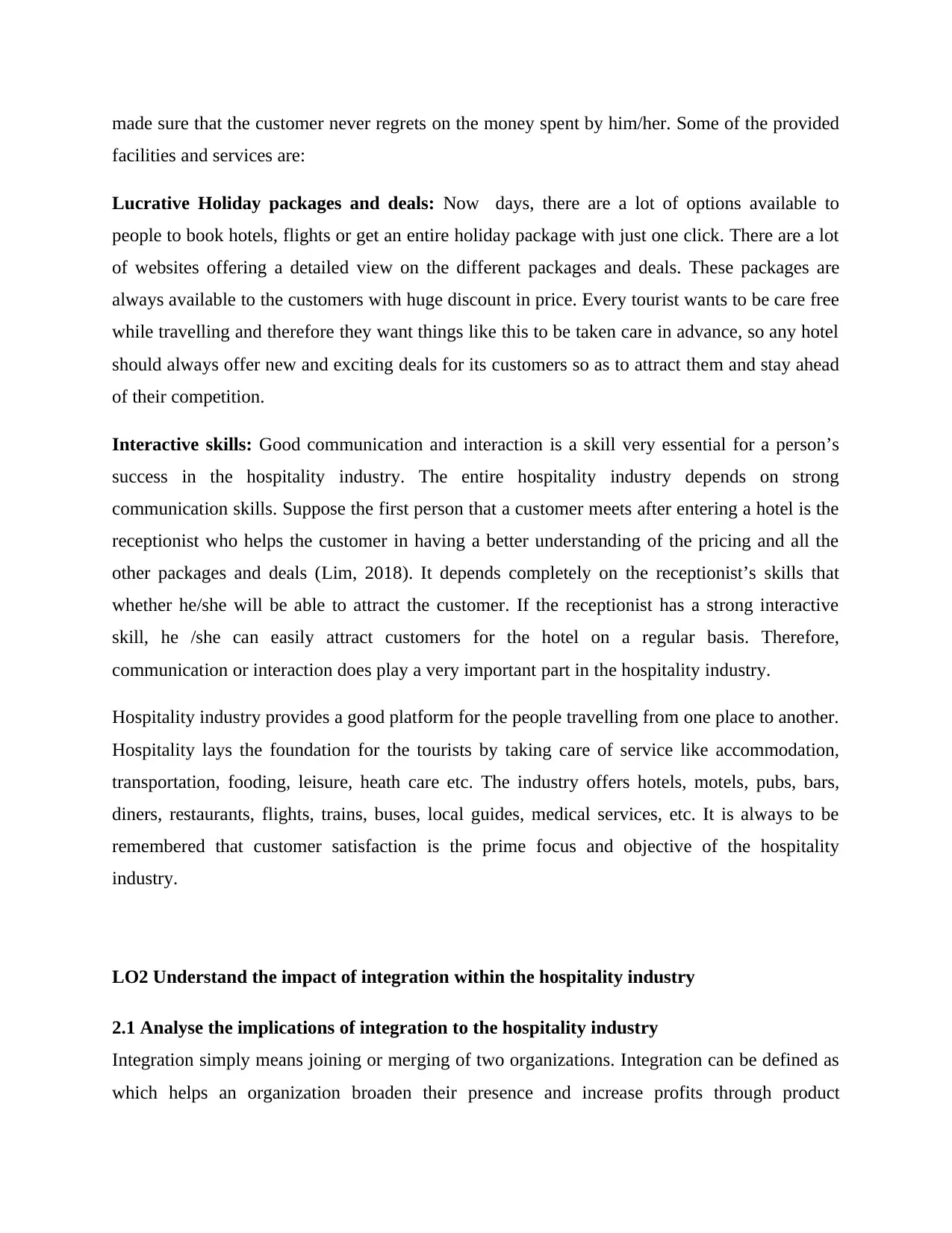
made sure that the customer never regrets on the money spent by him/her. Some of the provided
facilities and services are:
Lucrative Holiday packages and deals: Now days, there are a lot of options available to
people to book hotels, flights or get an entire holiday package with just one click. There are a lot
of websites offering a detailed view on the different packages and deals. These packages are
always available to the customers with huge discount in price. Every tourist wants to be care free
while travelling and therefore they want things like this to be taken care in advance, so any hotel
should always offer new and exciting deals for its customers so as to attract them and stay ahead
of their competition.
Interactive skills: Good communication and interaction is a skill very essential for a person’s
success in the hospitality industry. The entire hospitality industry depends on strong
communication skills. Suppose the first person that a customer meets after entering a hotel is the
receptionist who helps the customer in having a better understanding of the pricing and all the
other packages and deals (Lim, 2018). It depends completely on the receptionist’s skills that
whether he/she will be able to attract the customer. If the receptionist has a strong interactive
skill, he /she can easily attract customers for the hotel on a regular basis. Therefore,
communication or interaction does play a very important part in the hospitality industry.
Hospitality industry provides a good platform for the people travelling from one place to another.
Hospitality lays the foundation for the tourists by taking care of service like accommodation,
transportation, fooding, leisure, heath care etc. The industry offers hotels, motels, pubs, bars,
diners, restaurants, flights, trains, buses, local guides, medical services, etc. It is always to be
remembered that customer satisfaction is the prime focus and objective of the hospitality
industry.
LO2 Understand the impact of integration within the hospitality industry
2.1 Analyse the implications of integration to the hospitality industry
Integration simply means joining or merging of two organizations. Integration can be defined as
which helps an organization broaden their presence and increase profits through product
facilities and services are:
Lucrative Holiday packages and deals: Now days, there are a lot of options available to
people to book hotels, flights or get an entire holiday package with just one click. There are a lot
of websites offering a detailed view on the different packages and deals. These packages are
always available to the customers with huge discount in price. Every tourist wants to be care free
while travelling and therefore they want things like this to be taken care in advance, so any hotel
should always offer new and exciting deals for its customers so as to attract them and stay ahead
of their competition.
Interactive skills: Good communication and interaction is a skill very essential for a person’s
success in the hospitality industry. The entire hospitality industry depends on strong
communication skills. Suppose the first person that a customer meets after entering a hotel is the
receptionist who helps the customer in having a better understanding of the pricing and all the
other packages and deals (Lim, 2018). It depends completely on the receptionist’s skills that
whether he/she will be able to attract the customer. If the receptionist has a strong interactive
skill, he /she can easily attract customers for the hotel on a regular basis. Therefore,
communication or interaction does play a very important part in the hospitality industry.
Hospitality industry provides a good platform for the people travelling from one place to another.
Hospitality lays the foundation for the tourists by taking care of service like accommodation,
transportation, fooding, leisure, heath care etc. The industry offers hotels, motels, pubs, bars,
diners, restaurants, flights, trains, buses, local guides, medical services, etc. It is always to be
remembered that customer satisfaction is the prime focus and objective of the hospitality
industry.
LO2 Understand the impact of integration within the hospitality industry
2.1 Analyse the implications of integration to the hospitality industry
Integration simply means joining or merging of two organizations. Integration can be defined as
which helps an organization broaden their presence and increase profits through product
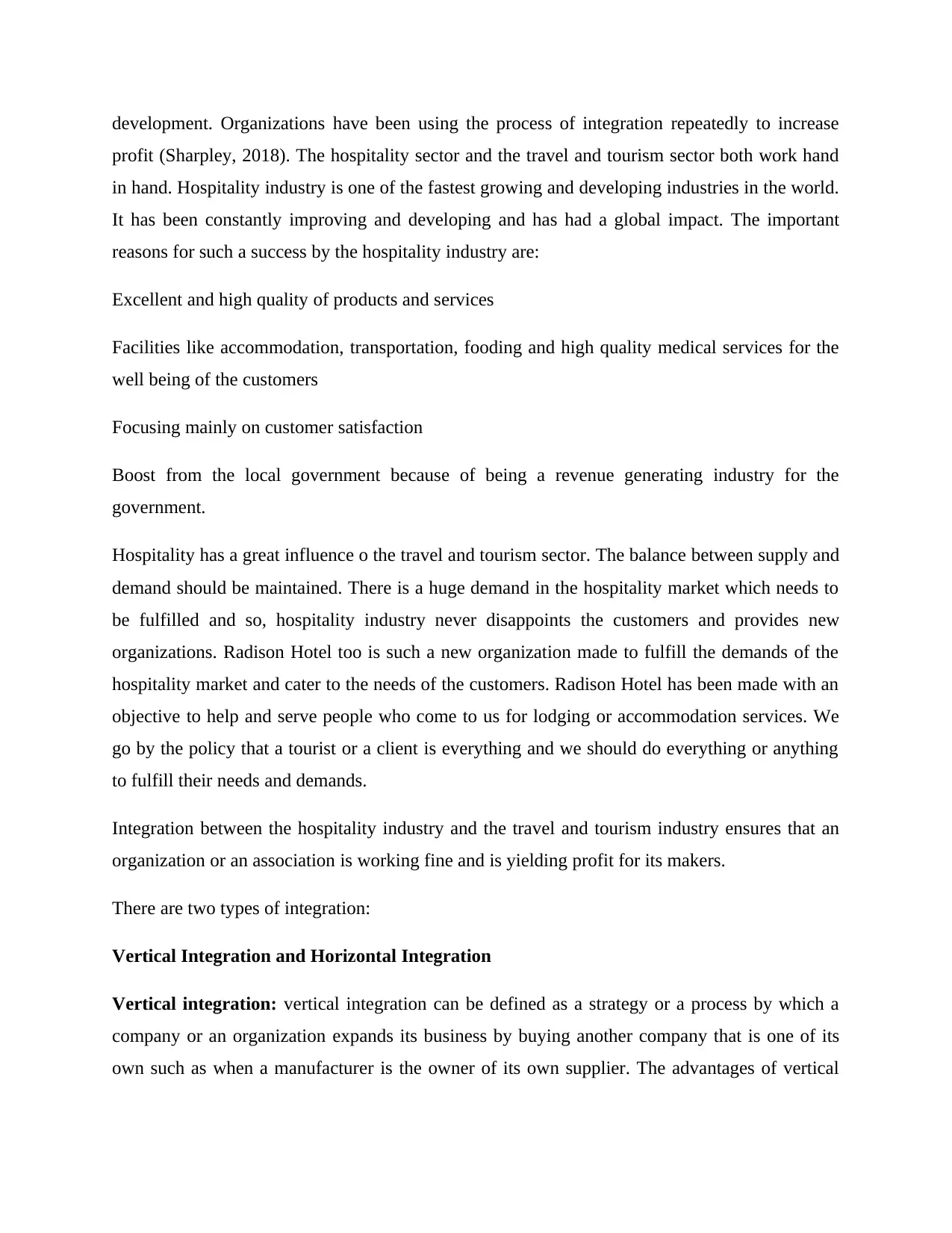
development. Organizations have been using the process of integration repeatedly to increase
profit (Sharpley, 2018). The hospitality sector and the travel and tourism sector both work hand
in hand. Hospitality industry is one of the fastest growing and developing industries in the world.
It has been constantly improving and developing and has had a global impact. The important
reasons for such a success by the hospitality industry are:
Excellent and high quality of products and services
Facilities like accommodation, transportation, fooding and high quality medical services for the
well being of the customers
Focusing mainly on customer satisfaction
Boost from the local government because of being a revenue generating industry for the
government.
Hospitality has a great influence o the travel and tourism sector. The balance between supply and
demand should be maintained. There is a huge demand in the hospitality market which needs to
be fulfilled and so, hospitality industry never disappoints the customers and provides new
organizations. Radison Hotel too is such a new organization made to fulfill the demands of the
hospitality market and cater to the needs of the customers. Radison Hotel has been made with an
objective to help and serve people who come to us for lodging or accommodation services. We
go by the policy that a tourist or a client is everything and we should do everything or anything
to fulfill their needs and demands.
Integration between the hospitality industry and the travel and tourism industry ensures that an
organization or an association is working fine and is yielding profit for its makers.
There are two types of integration:
Vertical Integration and Horizontal Integration
Vertical integration: vertical integration can be defined as a strategy or a process by which a
company or an organization expands its business by buying another company that is one of its
own such as when a manufacturer is the owner of its own supplier. The advantages of vertical
profit (Sharpley, 2018). The hospitality sector and the travel and tourism sector both work hand
in hand. Hospitality industry is one of the fastest growing and developing industries in the world.
It has been constantly improving and developing and has had a global impact. The important
reasons for such a success by the hospitality industry are:
Excellent and high quality of products and services
Facilities like accommodation, transportation, fooding and high quality medical services for the
well being of the customers
Focusing mainly on customer satisfaction
Boost from the local government because of being a revenue generating industry for the
government.
Hospitality has a great influence o the travel and tourism sector. The balance between supply and
demand should be maintained. There is a huge demand in the hospitality market which needs to
be fulfilled and so, hospitality industry never disappoints the customers and provides new
organizations. Radison Hotel too is such a new organization made to fulfill the demands of the
hospitality market and cater to the needs of the customers. Radison Hotel has been made with an
objective to help and serve people who come to us for lodging or accommodation services. We
go by the policy that a tourist or a client is everything and we should do everything or anything
to fulfill their needs and demands.
Integration between the hospitality industry and the travel and tourism industry ensures that an
organization or an association is working fine and is yielding profit for its makers.
There are two types of integration:
Vertical Integration and Horizontal Integration
Vertical integration: vertical integration can be defined as a strategy or a process by which a
company or an organization expands its business by buying another company that is one of its
own such as when a manufacturer is the owner of its own supplier. The advantages of vertical
⊘ This is a preview!⊘
Do you want full access?
Subscribe today to unlock all pages.

Trusted by 1+ million students worldwide
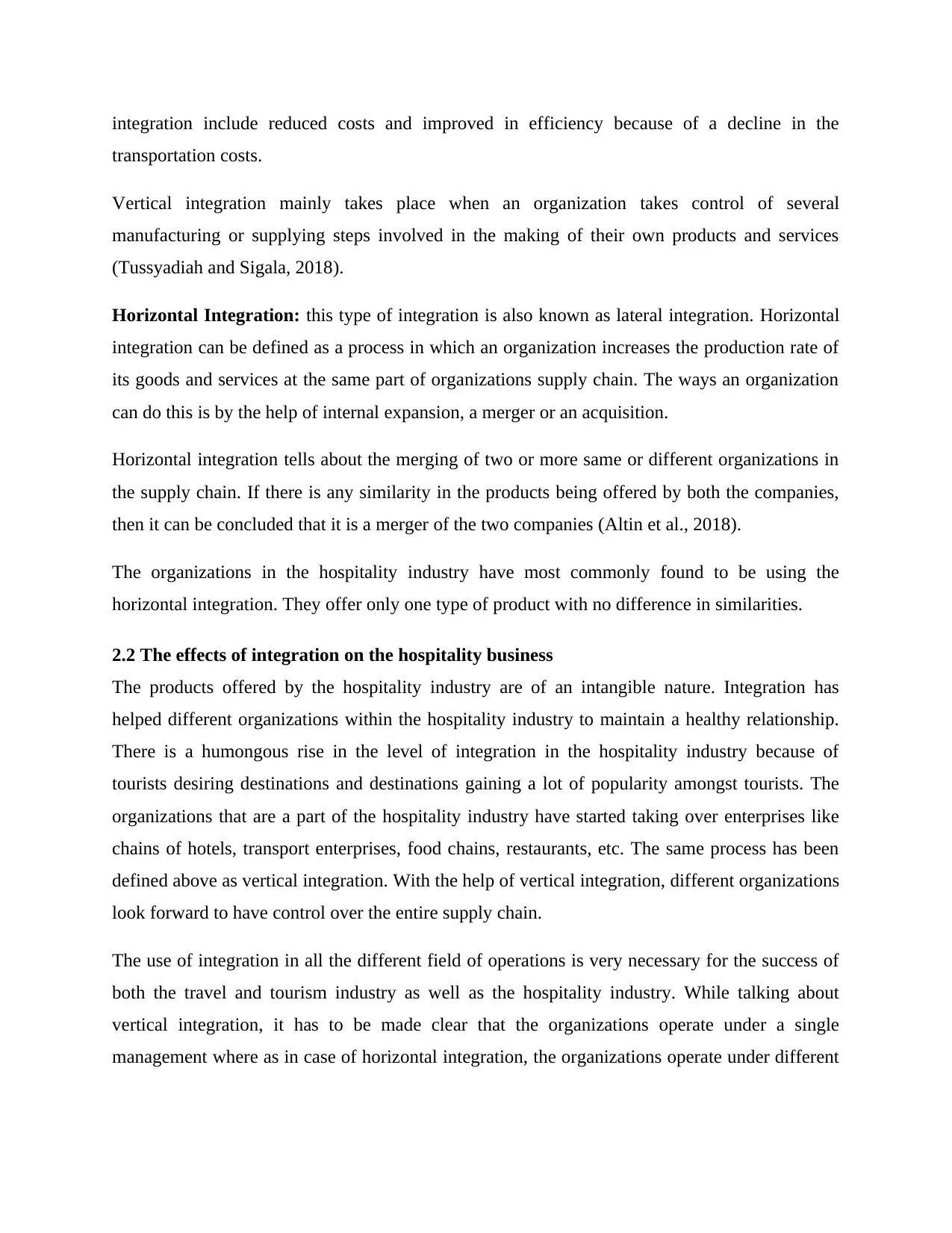
integration include reduced costs and improved in efficiency because of a decline in the
transportation costs.
Vertical integration mainly takes place when an organization takes control of several
manufacturing or supplying steps involved in the making of their own products and services
(Tussyadiah and Sigala, 2018).
Horizontal Integration: this type of integration is also known as lateral integration. Horizontal
integration can be defined as a process in which an organization increases the production rate of
its goods and services at the same part of organizations supply chain. The ways an organization
can do this is by the help of internal expansion, a merger or an acquisition.
Horizontal integration tells about the merging of two or more same or different organizations in
the supply chain. If there is any similarity in the products being offered by both the companies,
then it can be concluded that it is a merger of the two companies (Altin et al., 2018).
The organizations in the hospitality industry have most commonly found to be using the
horizontal integration. They offer only one type of product with no difference in similarities.
2.2 The effects of integration on the hospitality business
The products offered by the hospitality industry are of an intangible nature. Integration has
helped different organizations within the hospitality industry to maintain a healthy relationship.
There is a humongous rise in the level of integration in the hospitality industry because of
tourists desiring destinations and destinations gaining a lot of popularity amongst tourists. The
organizations that are a part of the hospitality industry have started taking over enterprises like
chains of hotels, transport enterprises, food chains, restaurants, etc. The same process has been
defined above as vertical integration. With the help of vertical integration, different organizations
look forward to have control over the entire supply chain.
The use of integration in all the different field of operations is very necessary for the success of
both the travel and tourism industry as well as the hospitality industry. While talking about
vertical integration, it has to be made clear that the organizations operate under a single
management where as in case of horizontal integration, the organizations operate under different
transportation costs.
Vertical integration mainly takes place when an organization takes control of several
manufacturing or supplying steps involved in the making of their own products and services
(Tussyadiah and Sigala, 2018).
Horizontal Integration: this type of integration is also known as lateral integration. Horizontal
integration can be defined as a process in which an organization increases the production rate of
its goods and services at the same part of organizations supply chain. The ways an organization
can do this is by the help of internal expansion, a merger or an acquisition.
Horizontal integration tells about the merging of two or more same or different organizations in
the supply chain. If there is any similarity in the products being offered by both the companies,
then it can be concluded that it is a merger of the two companies (Altin et al., 2018).
The organizations in the hospitality industry have most commonly found to be using the
horizontal integration. They offer only one type of product with no difference in similarities.
2.2 The effects of integration on the hospitality business
The products offered by the hospitality industry are of an intangible nature. Integration has
helped different organizations within the hospitality industry to maintain a healthy relationship.
There is a humongous rise in the level of integration in the hospitality industry because of
tourists desiring destinations and destinations gaining a lot of popularity amongst tourists. The
organizations that are a part of the hospitality industry have started taking over enterprises like
chains of hotels, transport enterprises, food chains, restaurants, etc. The same process has been
defined above as vertical integration. With the help of vertical integration, different organizations
look forward to have control over the entire supply chain.
The use of integration in all the different field of operations is very necessary for the success of
both the travel and tourism industry as well as the hospitality industry. While talking about
vertical integration, it has to be made clear that the organizations operate under a single
management where as in case of horizontal integration, the organizations operate under different
Paraphrase This Document
Need a fresh take? Get an instant paraphrase of this document with our AI Paraphraser
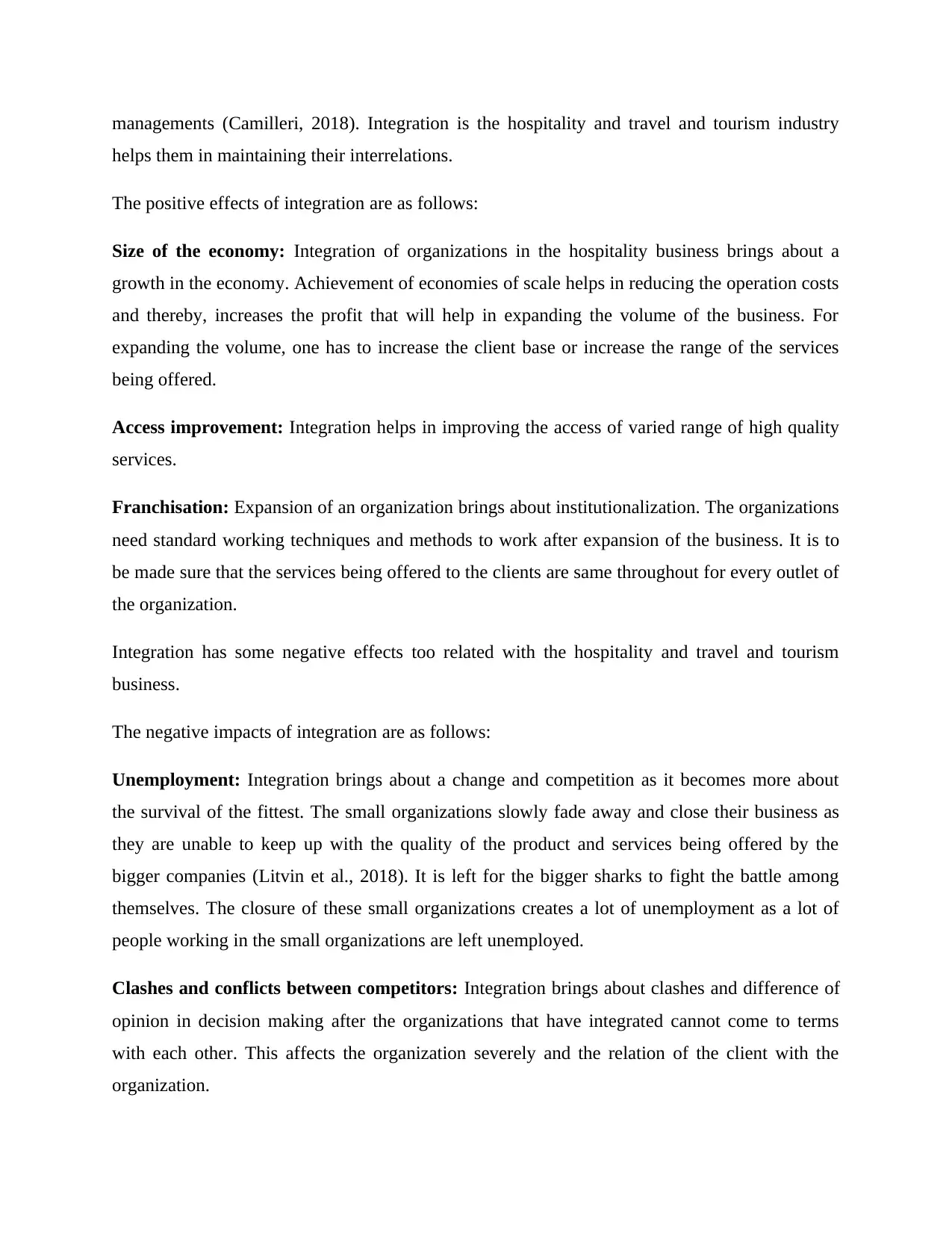
managements (Camilleri, 2018). Integration is the hospitality and travel and tourism industry
helps them in maintaining their interrelations.
The positive effects of integration are as follows:
Size of the economy: Integration of organizations in the hospitality business brings about a
growth in the economy. Achievement of economies of scale helps in reducing the operation costs
and thereby, increases the profit that will help in expanding the volume of the business. For
expanding the volume, one has to increase the client base or increase the range of the services
being offered.
Access improvement: Integration helps in improving the access of varied range of high quality
services.
Franchisation: Expansion of an organization brings about institutionalization. The organizations
need standard working techniques and methods to work after expansion of the business. It is to
be made sure that the services being offered to the clients are same throughout for every outlet of
the organization.
Integration has some negative effects too related with the hospitality and travel and tourism
business.
The negative impacts of integration are as follows:
Unemployment: Integration brings about a change and competition as it becomes more about
the survival of the fittest. The small organizations slowly fade away and close their business as
they are unable to keep up with the quality of the product and services being offered by the
bigger companies (Litvin et al., 2018). It is left for the bigger sharks to fight the battle among
themselves. The closure of these small organizations creates a lot of unemployment as a lot of
people working in the small organizations are left unemployed.
Clashes and conflicts between competitors: Integration brings about clashes and difference of
opinion in decision making after the organizations that have integrated cannot come to terms
with each other. This affects the organization severely and the relation of the client with the
organization.
helps them in maintaining their interrelations.
The positive effects of integration are as follows:
Size of the economy: Integration of organizations in the hospitality business brings about a
growth in the economy. Achievement of economies of scale helps in reducing the operation costs
and thereby, increases the profit that will help in expanding the volume of the business. For
expanding the volume, one has to increase the client base or increase the range of the services
being offered.
Access improvement: Integration helps in improving the access of varied range of high quality
services.
Franchisation: Expansion of an organization brings about institutionalization. The organizations
need standard working techniques and methods to work after expansion of the business. It is to
be made sure that the services being offered to the clients are same throughout for every outlet of
the organization.
Integration has some negative effects too related with the hospitality and travel and tourism
business.
The negative impacts of integration are as follows:
Unemployment: Integration brings about a change and competition as it becomes more about
the survival of the fittest. The small organizations slowly fade away and close their business as
they are unable to keep up with the quality of the product and services being offered by the
bigger companies (Litvin et al., 2018). It is left for the bigger sharks to fight the battle among
themselves. The closure of these small organizations creates a lot of unemployment as a lot of
people working in the small organizations are left unemployed.
Clashes and conflicts between competitors: Integration brings about clashes and difference of
opinion in decision making after the organizations that have integrated cannot come to terms
with each other. This affects the organization severely and the relation of the client with the
organization.
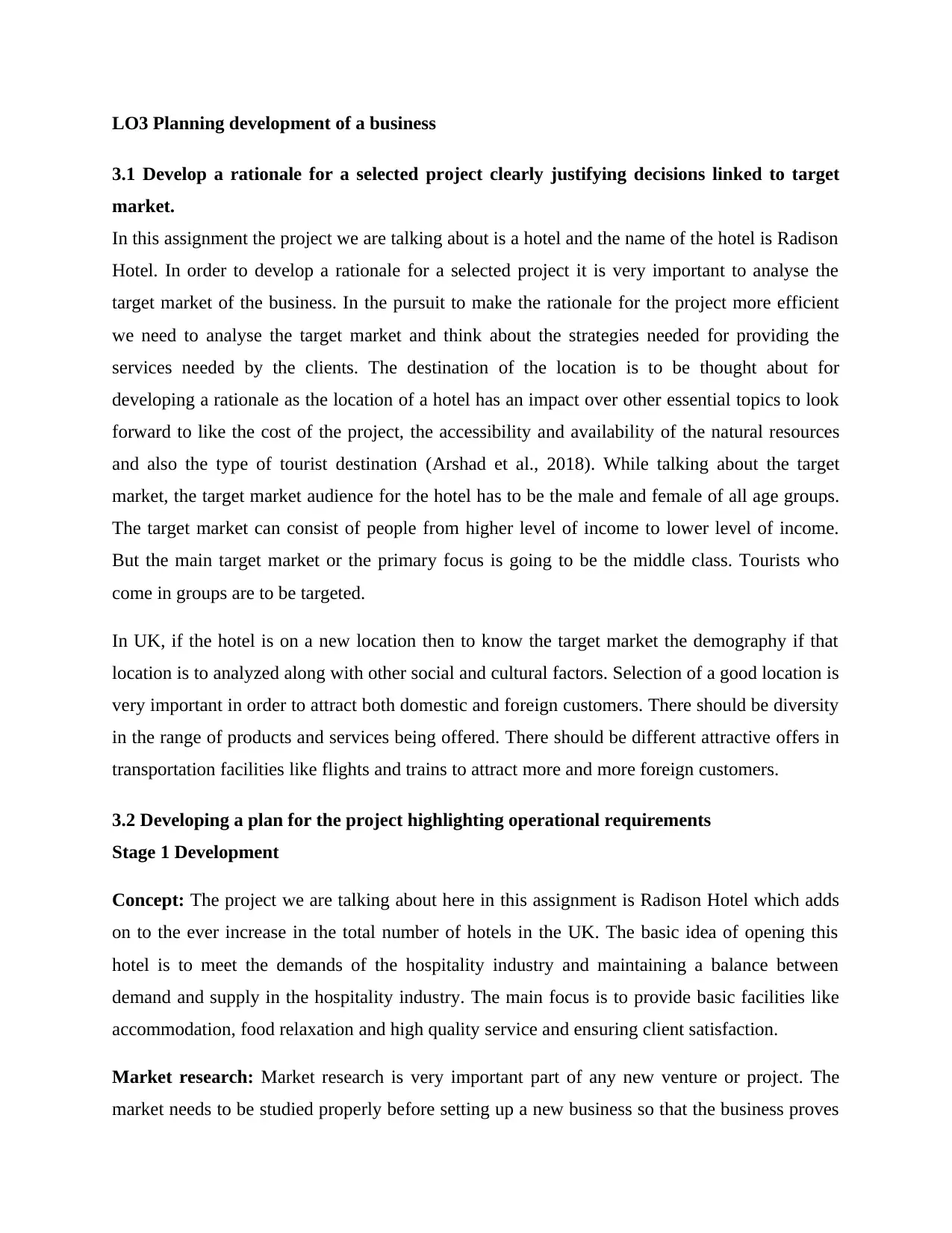
LO3 Planning development of a business
3.1 Develop a rationale for a selected project clearly justifying decisions linked to target
market.
In this assignment the project we are talking about is a hotel and the name of the hotel is Radison
Hotel. In order to develop a rationale for a selected project it is very important to analyse the
target market of the business. In the pursuit to make the rationale for the project more efficient
we need to analyse the target market and think about the strategies needed for providing the
services needed by the clients. The destination of the location is to be thought about for
developing a rationale as the location of a hotel has an impact over other essential topics to look
forward to like the cost of the project, the accessibility and availability of the natural resources
and also the type of tourist destination (Arshad et al., 2018). While talking about the target
market, the target market audience for the hotel has to be the male and female of all age groups.
The target market can consist of people from higher level of income to lower level of income.
But the main target market or the primary focus is going to be the middle class. Tourists who
come in groups are to be targeted.
In UK, if the hotel is on a new location then to know the target market the demography if that
location is to analyzed along with other social and cultural factors. Selection of a good location is
very important in order to attract both domestic and foreign customers. There should be diversity
in the range of products and services being offered. There should be different attractive offers in
transportation facilities like flights and trains to attract more and more foreign customers.
3.2 Developing a plan for the project highlighting operational requirements
Stage 1 Development
Concept: The project we are talking about here in this assignment is Radison Hotel which adds
on to the ever increase in the total number of hotels in the UK. The basic idea of opening this
hotel is to meet the demands of the hospitality industry and maintaining a balance between
demand and supply in the hospitality industry. The main focus is to provide basic facilities like
accommodation, food relaxation and high quality service and ensuring client satisfaction.
Market research: Market research is very important part of any new venture or project. The
market needs to be studied properly before setting up a new business so that the business proves
3.1 Develop a rationale for a selected project clearly justifying decisions linked to target
market.
In this assignment the project we are talking about is a hotel and the name of the hotel is Radison
Hotel. In order to develop a rationale for a selected project it is very important to analyse the
target market of the business. In the pursuit to make the rationale for the project more efficient
we need to analyse the target market and think about the strategies needed for providing the
services needed by the clients. The destination of the location is to be thought about for
developing a rationale as the location of a hotel has an impact over other essential topics to look
forward to like the cost of the project, the accessibility and availability of the natural resources
and also the type of tourist destination (Arshad et al., 2018). While talking about the target
market, the target market audience for the hotel has to be the male and female of all age groups.
The target market can consist of people from higher level of income to lower level of income.
But the main target market or the primary focus is going to be the middle class. Tourists who
come in groups are to be targeted.
In UK, if the hotel is on a new location then to know the target market the demography if that
location is to analyzed along with other social and cultural factors. Selection of a good location is
very important in order to attract both domestic and foreign customers. There should be diversity
in the range of products and services being offered. There should be different attractive offers in
transportation facilities like flights and trains to attract more and more foreign customers.
3.2 Developing a plan for the project highlighting operational requirements
Stage 1 Development
Concept: The project we are talking about here in this assignment is Radison Hotel which adds
on to the ever increase in the total number of hotels in the UK. The basic idea of opening this
hotel is to meet the demands of the hospitality industry and maintaining a balance between
demand and supply in the hospitality industry. The main focus is to provide basic facilities like
accommodation, food relaxation and high quality service and ensuring client satisfaction.
Market research: Market research is very important part of any new venture or project. The
market needs to be studied properly before setting up a new business so that the business proves
⊘ This is a preview!⊘
Do you want full access?
Subscribe today to unlock all pages.

Trusted by 1+ million students worldwide
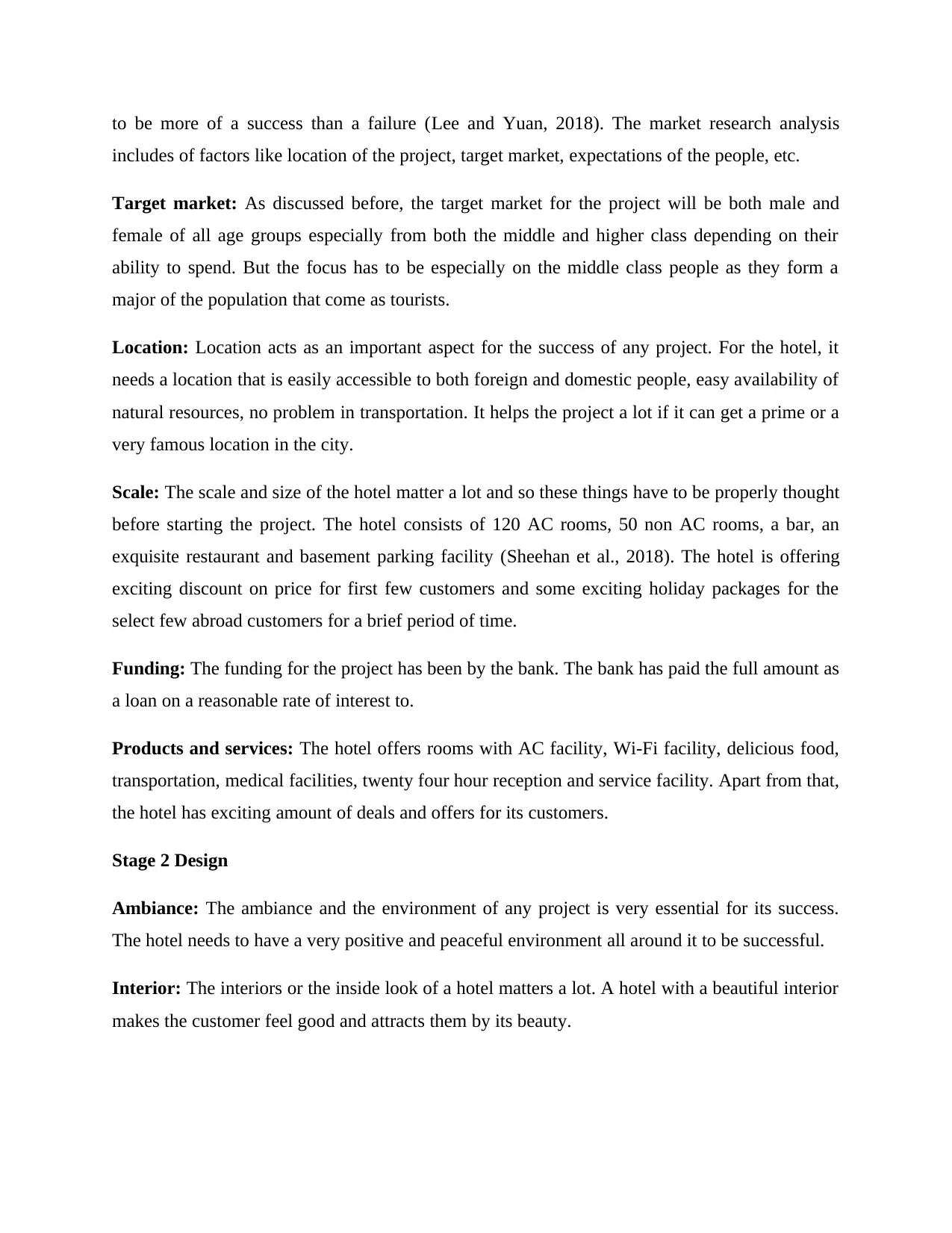
to be more of a success than a failure (Lee and Yuan, 2018). The market research analysis
includes of factors like location of the project, target market, expectations of the people, etc.
Target market: As discussed before, the target market for the project will be both male and
female of all age groups especially from both the middle and higher class depending on their
ability to spend. But the focus has to be especially on the middle class people as they form a
major of the population that come as tourists.
Location: Location acts as an important aspect for the success of any project. For the hotel, it
needs a location that is easily accessible to both foreign and domestic people, easy availability of
natural resources, no problem in transportation. It helps the project a lot if it can get a prime or a
very famous location in the city.
Scale: The scale and size of the hotel matter a lot and so these things have to be properly thought
before starting the project. The hotel consists of 120 AC rooms, 50 non AC rooms, a bar, an
exquisite restaurant and basement parking facility (Sheehan et al., 2018). The hotel is offering
exciting discount on price for first few customers and some exciting holiday packages for the
select few abroad customers for a brief period of time.
Funding: The funding for the project has been by the bank. The bank has paid the full amount as
a loan on a reasonable rate of interest to.
Products and services: The hotel offers rooms with AC facility, Wi-Fi facility, delicious food,
transportation, medical facilities, twenty four hour reception and service facility. Apart from that,
the hotel has exciting amount of deals and offers for its customers.
Stage 2 Design
Ambiance: The ambiance and the environment of any project is very essential for its success.
The hotel needs to have a very positive and peaceful environment all around it to be successful.
Interior: The interiors or the inside look of a hotel matters a lot. A hotel with a beautiful interior
makes the customer feel good and attracts them by its beauty.
includes of factors like location of the project, target market, expectations of the people, etc.
Target market: As discussed before, the target market for the project will be both male and
female of all age groups especially from both the middle and higher class depending on their
ability to spend. But the focus has to be especially on the middle class people as they form a
major of the population that come as tourists.
Location: Location acts as an important aspect for the success of any project. For the hotel, it
needs a location that is easily accessible to both foreign and domestic people, easy availability of
natural resources, no problem in transportation. It helps the project a lot if it can get a prime or a
very famous location in the city.
Scale: The scale and size of the hotel matter a lot and so these things have to be properly thought
before starting the project. The hotel consists of 120 AC rooms, 50 non AC rooms, a bar, an
exquisite restaurant and basement parking facility (Sheehan et al., 2018). The hotel is offering
exciting discount on price for first few customers and some exciting holiday packages for the
select few abroad customers for a brief period of time.
Funding: The funding for the project has been by the bank. The bank has paid the full amount as
a loan on a reasonable rate of interest to.
Products and services: The hotel offers rooms with AC facility, Wi-Fi facility, delicious food,
transportation, medical facilities, twenty four hour reception and service facility. Apart from that,
the hotel has exciting amount of deals and offers for its customers.
Stage 2 Design
Ambiance: The ambiance and the environment of any project is very essential for its success.
The hotel needs to have a very positive and peaceful environment all around it to be successful.
Interior: The interiors or the inside look of a hotel matters a lot. A hotel with a beautiful interior
makes the customer feel good and attracts them by its beauty.
Paraphrase This Document
Need a fresh take? Get an instant paraphrase of this document with our AI Paraphraser
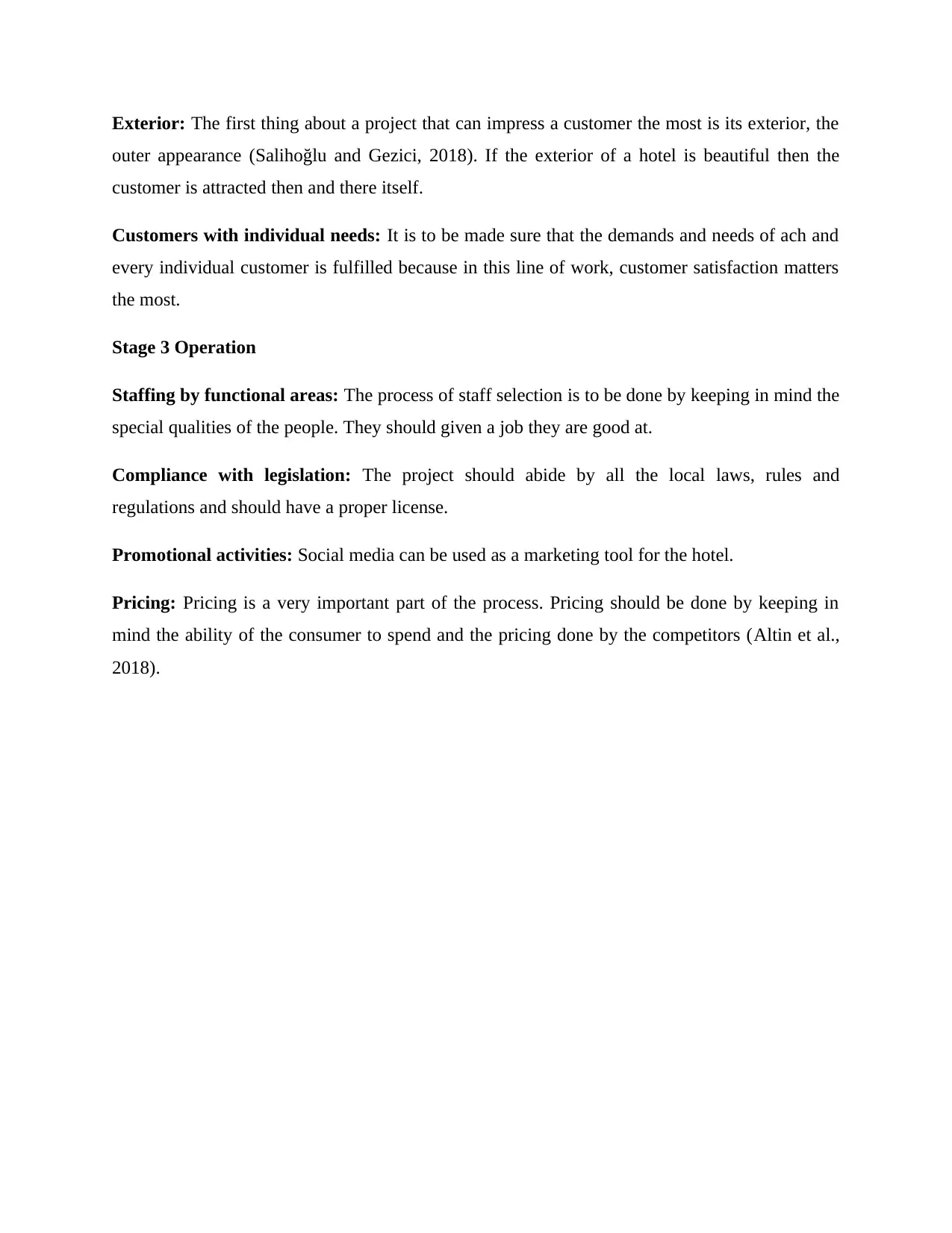
Exterior: The first thing about a project that can impress a customer the most is its exterior, the
outer appearance (Salihoğlu and Gezici, 2018). If the exterior of a hotel is beautiful then the
customer is attracted then and there itself.
Customers with individual needs: It is to be made sure that the demands and needs of ach and
every individual customer is fulfilled because in this line of work, customer satisfaction matters
the most.
Stage 3 Operation
Staffing by functional areas: The process of staff selection is to be done by keeping in mind the
special qualities of the people. They should given a job they are good at.
Compliance with legislation: The project should abide by all the local laws, rules and
regulations and should have a proper license.
Promotional activities: Social media can be used as a marketing tool for the hotel.
Pricing: Pricing is a very important part of the process. Pricing should be done by keeping in
mind the ability of the consumer to spend and the pricing done by the competitors (Altin et al.,
2018).
outer appearance (Salihoğlu and Gezici, 2018). If the exterior of a hotel is beautiful then the
customer is attracted then and there itself.
Customers with individual needs: It is to be made sure that the demands and needs of ach and
every individual customer is fulfilled because in this line of work, customer satisfaction matters
the most.
Stage 3 Operation
Staffing by functional areas: The process of staff selection is to be done by keeping in mind the
special qualities of the people. They should given a job they are good at.
Compliance with legislation: The project should abide by all the local laws, rules and
regulations and should have a proper license.
Promotional activities: Social media can be used as a marketing tool for the hotel.
Pricing: Pricing is a very important part of the process. Pricing should be done by keeping in
mind the ability of the consumer to spend and the pricing done by the competitors (Altin et al.,
2018).
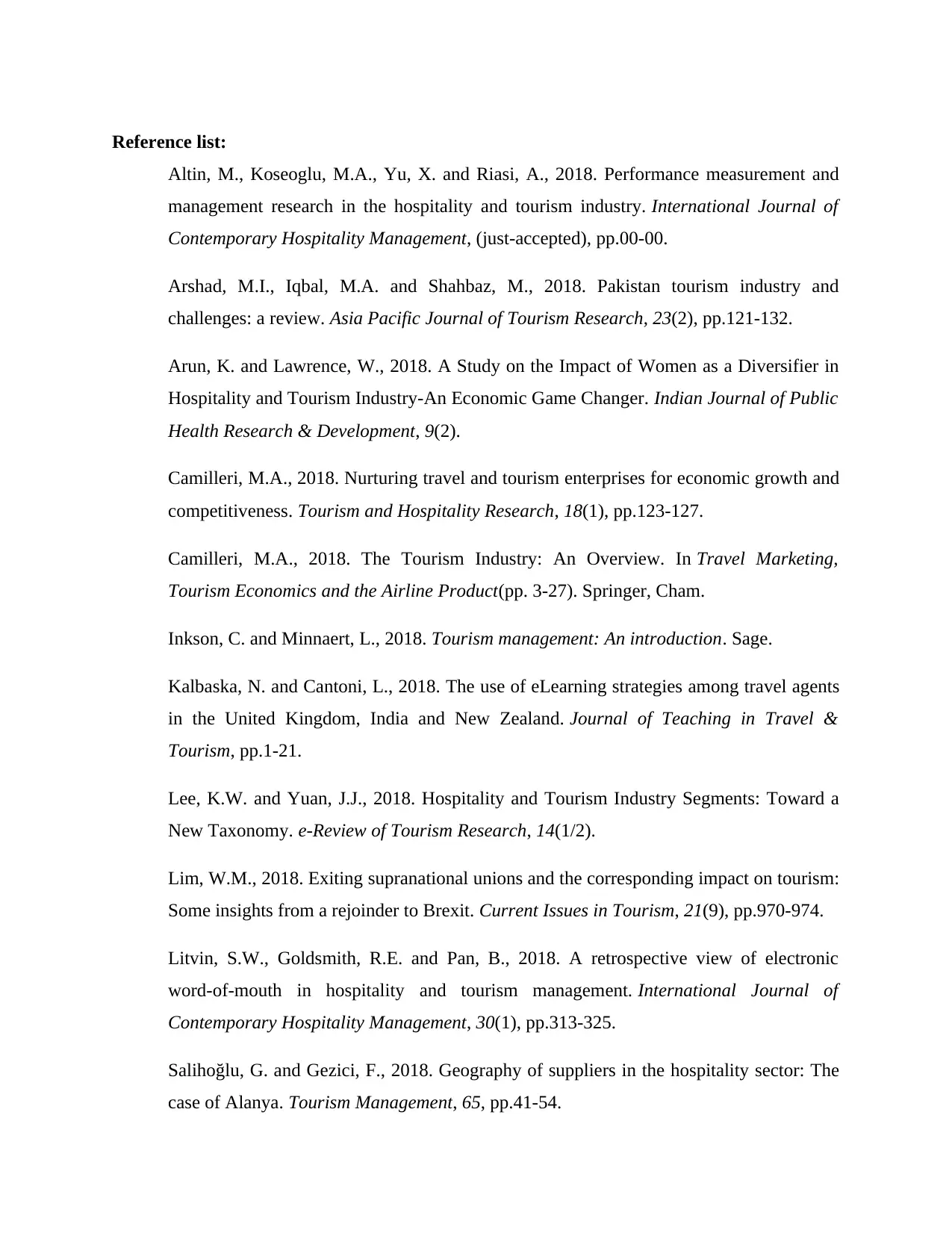
Reference list:
Altin, M., Koseoglu, M.A., Yu, X. and Riasi, A., 2018. Performance measurement and
management research in the hospitality and tourism industry. International Journal of
Contemporary Hospitality Management, (just-accepted), pp.00-00.
Arshad, M.I., Iqbal, M.A. and Shahbaz, M., 2018. Pakistan tourism industry and
challenges: a review. Asia Pacific Journal of Tourism Research, 23(2), pp.121-132.
Arun, K. and Lawrence, W., 2018. A Study on the Impact of Women as a Diversifier in
Hospitality and Tourism Industry-An Economic Game Changer. Indian Journal of Public
Health Research & Development, 9(2).
Camilleri, M.A., 2018. Nurturing travel and tourism enterprises for economic growth and
competitiveness. Tourism and Hospitality Research, 18(1), pp.123-127.
Camilleri, M.A., 2018. The Tourism Industry: An Overview. In Travel Marketing,
Tourism Economics and the Airline Product(pp. 3-27). Springer, Cham.
Inkson, C. and Minnaert, L., 2018. Tourism management: An introduction. Sage.
Kalbaska, N. and Cantoni, L., 2018. The use of eLearning strategies among travel agents
in the United Kingdom, India and New Zealand. Journal of Teaching in Travel &
Tourism, pp.1-21.
Lee, K.W. and Yuan, J.J., 2018. Hospitality and Tourism Industry Segments: Toward a
New Taxonomy. e-Review of Tourism Research, 14(1/2).
Lim, W.M., 2018. Exiting supranational unions and the corresponding impact on tourism:
Some insights from a rejoinder to Brexit. Current Issues in Tourism, 21(9), pp.970-974.
Litvin, S.W., Goldsmith, R.E. and Pan, B., 2018. A retrospective view of electronic
word-of-mouth in hospitality and tourism management. International Journal of
Contemporary Hospitality Management, 30(1), pp.313-325.
Salihoğlu, G. and Gezici, F., 2018. Geography of suppliers in the hospitality sector: The
case of Alanya. Tourism Management, 65, pp.41-54.
Altin, M., Koseoglu, M.A., Yu, X. and Riasi, A., 2018. Performance measurement and
management research in the hospitality and tourism industry. International Journal of
Contemporary Hospitality Management, (just-accepted), pp.00-00.
Arshad, M.I., Iqbal, M.A. and Shahbaz, M., 2018. Pakistan tourism industry and
challenges: a review. Asia Pacific Journal of Tourism Research, 23(2), pp.121-132.
Arun, K. and Lawrence, W., 2018. A Study on the Impact of Women as a Diversifier in
Hospitality and Tourism Industry-An Economic Game Changer. Indian Journal of Public
Health Research & Development, 9(2).
Camilleri, M.A., 2018. Nurturing travel and tourism enterprises for economic growth and
competitiveness. Tourism and Hospitality Research, 18(1), pp.123-127.
Camilleri, M.A., 2018. The Tourism Industry: An Overview. In Travel Marketing,
Tourism Economics and the Airline Product(pp. 3-27). Springer, Cham.
Inkson, C. and Minnaert, L., 2018. Tourism management: An introduction. Sage.
Kalbaska, N. and Cantoni, L., 2018. The use of eLearning strategies among travel agents
in the United Kingdom, India and New Zealand. Journal of Teaching in Travel &
Tourism, pp.1-21.
Lee, K.W. and Yuan, J.J., 2018. Hospitality and Tourism Industry Segments: Toward a
New Taxonomy. e-Review of Tourism Research, 14(1/2).
Lim, W.M., 2018. Exiting supranational unions and the corresponding impact on tourism:
Some insights from a rejoinder to Brexit. Current Issues in Tourism, 21(9), pp.970-974.
Litvin, S.W., Goldsmith, R.E. and Pan, B., 2018. A retrospective view of electronic
word-of-mouth in hospitality and tourism management. International Journal of
Contemporary Hospitality Management, 30(1), pp.313-325.
Salihoğlu, G. and Gezici, F., 2018. Geography of suppliers in the hospitality sector: The
case of Alanya. Tourism Management, 65, pp.41-54.
⊘ This is a preview!⊘
Do you want full access?
Subscribe today to unlock all pages.

Trusted by 1+ million students worldwide
1 out of 13
Related Documents
Your All-in-One AI-Powered Toolkit for Academic Success.
+13062052269
info@desklib.com
Available 24*7 on WhatsApp / Email
![[object Object]](/_next/static/media/star-bottom.7253800d.svg)
Unlock your academic potential
Copyright © 2020–2026 A2Z Services. All Rights Reserved. Developed and managed by ZUCOL.



